May 20, 2025 | 13:49 GMT +7
May 20, 2025 | 13:49 GMT +7
Hotline: 0913.378.918
May 20, 2025 | 13:49 GMT +7
Hotline: 0913.378.918
Hoa Binh has a large citrus fruit production area, accounting for over 5% of the national citrus production area. Over the years, the citrus fruit trees area in Hoa Binh has continuously increased. In 2020, the citrus tree area was about 11,500 ha, and the business area was about 7,400 ha.
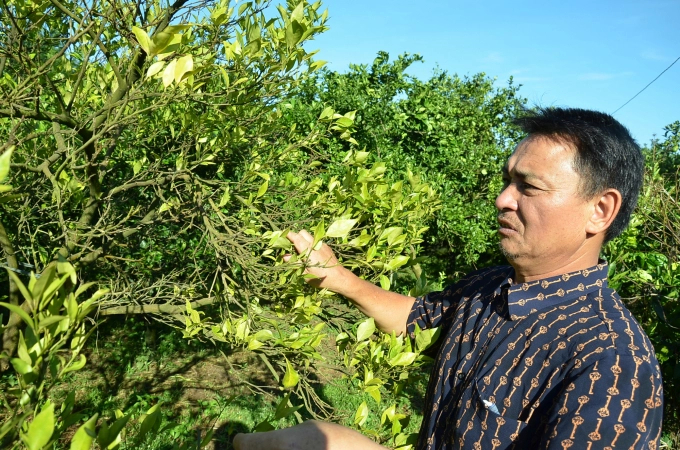
"Rushing development" and pursuing productivity at all costs have pushed many citrus areas of Hoa Binh into extinction. Photo: Pham Hieu.
After the rapid growth of area and production, the sustainable development of citrus trees is suffering problems. Changes are essential.
For example, in Cao Phong district, due to the long-term cultivation process, the abuse of inorganic fertilizers, and chemical pesticides,...many soil areas have become hardened and lost their texture. The soil also has poor microflora, accumulating many sources of pests and diseases, and poses a significant risk to the sustainable development of citrus fruit trees.
Consequently, the Citrus Fruit Replanting Project is defined as production reorganization and putting priority on businesses. Cooperatives also have close production links with households, following a secured, synchronous, sustainable value chain from developing raw material areas to preliminary processing, processing, preserving, and consuming products.
From 2021 to 2025, the goal of the project is to focus on replanting citrus fruit trees in Cao Phong district with orange and tangerine trees on a scale of about 1,500 hectares.
In the period 2026 - 2030, the replanting of citrus fruit trees will expand to the remaining areas. These areas include Cao Phong district and concentrated citrus fruit growing districts of the province (Kim Boi, Tan Lac, Lac Thuy, Yen Thuy, Luong Son, Lac Son) with a total area of over 4,500 ha.
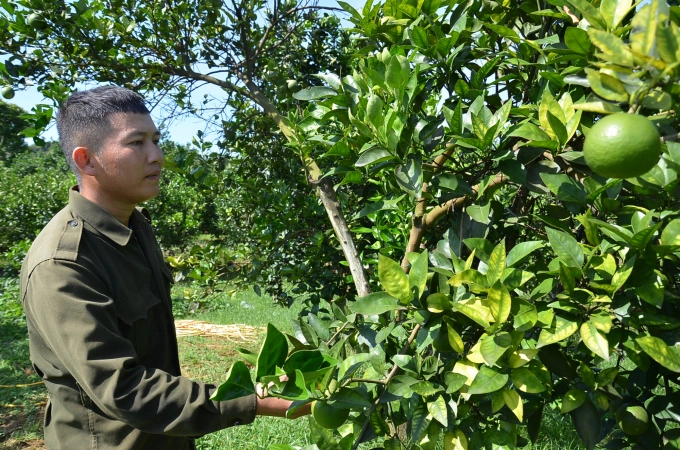
Many areas of oranges in Cao Phong (Hoa Binh) are "untreatable" due to diseases and the consequences of fertilizers and chemical pesticide abuse over a long period. Photo: Pham Hieu.
According to the Citrus Fruit Replanting Project in Hoa Binh province from 2021 to 2025, with a vision for 2030, in the period from 2021 to 2025, this province will focus on replanting large-scale about 1,500 ha of orange and tangerine trees in Cao Phong district.
Among 9 groups of solutions proposed by Hoa Binh, there is the concentration of disease-free seed sources and the research and application of advanced science and technology in citrus production and replanting. In addition, other solutions also include improving the efficiency of production organization, creating a land fund free of pests and diseases to serve the replanting of citrus trees, and at the same time promoting processing and trade promotion…
In the solution relating to seed varieties, the province currently recognizes 227 top-line trees of 9 popular citrus tree varieties (the tall Xa Doai orange, the short Xa Doai orange, CS1 (yellow-orange), BH orange (Marrs orange), Canh orange, On Chau tangerine, Ha Giang tangerine, Mien Doi tangerine, red pomelo).
According to Hoa Binh Department of MARD, this number of top-line trees is capable of providing over 350,000 grafts/year as breeding materials. Every year, the Department of MARD inspects the top-line trees for growth, development, and pest situations.
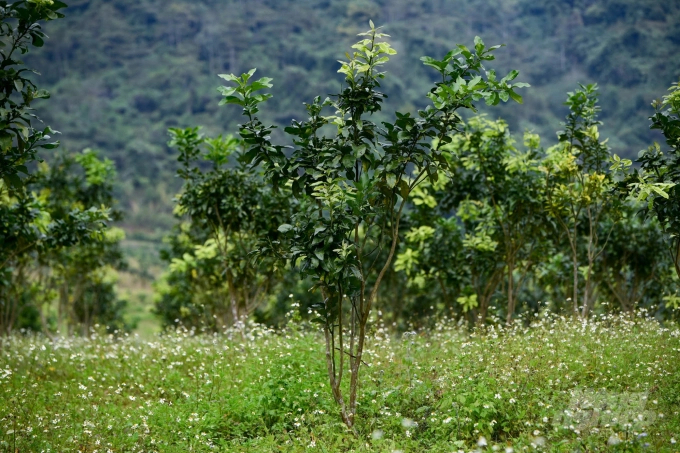
Hoa Binh has to regain the balance for the ecosystem in citrus production through the solution to restore the soil ecosystem. Photo: Tung Dinh.
The province has also received and put into use a 3-level breeding system that meets national standards at the province’s Plant Seeds - Animals and Fisheries Centre, including S0, S1 orchards, and an S2 tree planting system. This 3-level breeding system meets the province's demand for citrus fruit varieties. Currently, this system has sowed about 30,000 rootstocks (originating from sour pomelo seeds), and is expected to start the grafting in June 2022, and from August 2022, there will be qualified seedlings to provide for production.
In addition, Hoa Binh Department of MARD also advises the Provincial People's Committee to issue regulations on the management and exploitation of top-line trees and perennial fruit orchards in the province.
To replant citrus, Hoa Binh also promotes the creation of a clean land fund for citrus replanting in Cao Phong district. Specifically, the province reorganized the production in old orange areas, at the end of the exploitation cycle, with short-term crops such as beans, biomass corn, and banana trees,...
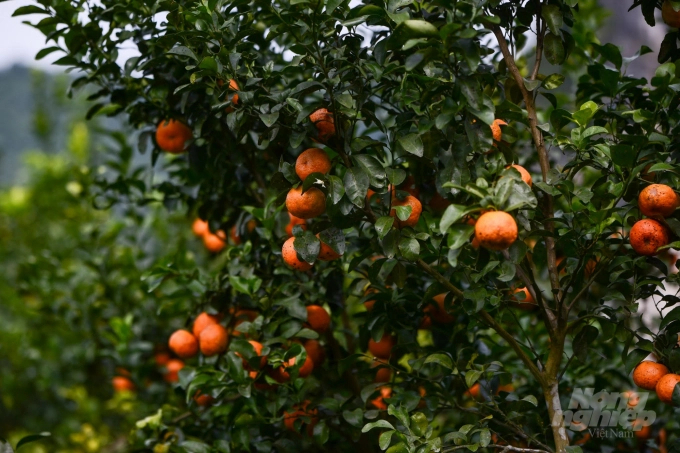
Currently, some organic citrus production models of Hoa Binh have initially stabilized and gradually spread to production. Photo: Pham Hieu.
Currently, about 780 ha of citrus trees have been rotated with other crops to improve the soil with a rotation period of 2-4 years. Most of the crop rotation area is supported in connection with the consumption stage with no product stagnation. Hoa Binh Department of MARD also coordinated with the Plant Protection Research Institute and relevant agencies to develop technical solutions for soil improvement, creating a pest-free land fund for citrus replanting. The solutions will soon be evaluated, finalized, and widely communicated to localities, establishments, and citrus producers…
Along with the completed category, Hoa Binh province’s Citrus Fruit Replanting Project is also facing many difficulties.
With the land improvement, the current rotation of other crops to improve the soil has been executed nicely. However, to confirm whether the soil after rotation is eligible for replanting citrus trees, it is necessary to have a sufficient scientific basis by taking samples to analyze and evaluate the level of residues of harmful organisms in the soil. On the other hand, there will be a need for further treatment and improvement solutions for areas of land that are not yet guaranteed to be free of pests and diseases for replanting.
To solve these problems, the Vice Chairman of Hoa Binh Provincial People's Committee, Mr. Dinh Cong Su directed the Department of MARD to coordinate with relevant agencies. MARD will coordinate with relevant agencies to propose capital sources of state budget nature and develop mechanisms and policies to support the implementation of the Project. In particular, the supporting content on disease-free seedlings, meeting national standards, support for soil improvement, and treatment of harmful organisms in the soil will be focused on.
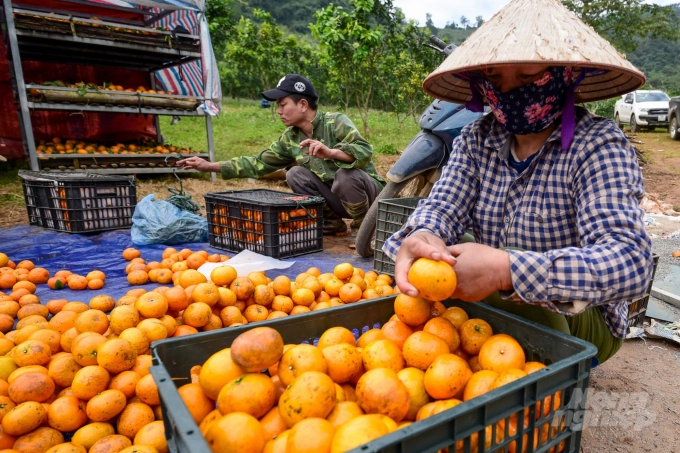
Hoa Binh's organic citrus fruit production models are "infiltrating" people and will gradually expand in the coming time. Photo: Tung Dinh.
Particularly for Cao Phong district, Mr. Dinh Cong Su requested to construct a sample field for orange tree replanting, utilizing backing resources from the central government, the province, the capital of businesses, and producers. The district will also need to closely follow the content of the Project such as reorganizing production, consumption, preliminary processing, and product preservation…
In addition, Cao Phong district must step up support to establish and improve the operation capacity of cooperatives, taking cooperatives and businesses as the heart of reorganizing orange tree production.
The district needs to resolutely handle cases of production, business, and trading of citrus fruit varieties (oranges, pomelos) that do not meet the prescribed national technical standards.
Through this project, citrus fruit production will be reorganized sustainably, forming into large planting areas, and ensuring a uniform supply of quality and looks.
The solution is to create a source of disease-free seed for replanting. It also includes synchronously implementing technical solutions to sustainably develop the raw material area, improve the efficiency of land, and protect the ecological environment in an organic direction.
Another important task is to ensure food safety requirements and product traceability with the supply of raw materials at all stages (fresh fruit products, semi-processed products, processed products) and strengthen, improving the value chain for citrus products.
Translated by Hoang Duy

(VAN) For years, the CRISPR-Cas9 genome technology has been reshaping genetic engineering, a precision tool to transform everything from agriculture to medicine.

(VAN) Vietnam aims to become a 'leader' in the region in the capacity and managing effectively soil health and crop nutrition.
![Reducing emissions from rice fields: [Part 1] Farming clean rice together](https://t.ex-cdn.com/nongnghiepmoitruong.vn/608w/files/news/2025/05/05/z6509661417740_a647202949c539012a959e841c03e1d3-nongnghiep-143611.jpg)
(VAN) Growing clean rice helps reduce environmental pollution while increasing income, allowing farmers to feel secure in production and remain committed to their fields for the long term.
/2025/05/19/5136-1-144800_230.jpg)
(VAN) The Nghe An Provincial People's Committee has just approved the list of beneficiaries eligible for revenue from the Emission Reductions Payment Agreement (ERPA) in the North Central region for the year 2025.

(VAN) 14 out of 35 domesticated elephants in Dak Lak province have had their living conditions improved, with 11 of them currently participating in the non-riding elephant tourism model.

(VAN) Muong Nhe Nature Reserve hopes that being upgraded to a national park will lay the foundation for forest protection efforts to be carried out in a systematic, modern, and sustainable manner.
/2025/05/16/3923-2-171845_52.jpg)
(VAN) Lower costs, higher yields, and improved soil quality are outstanding benefits that soybeans bring when integrated into the crop rotation system.